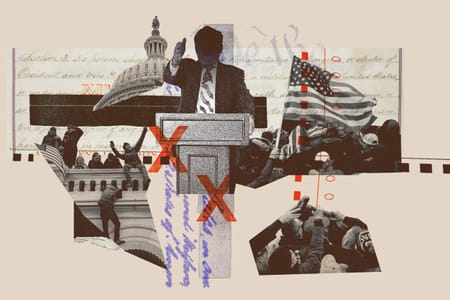Trump Should Be Barred from Holding Office

We break down the possibilities; the stakes are ridiculously high.

(Illustration: Ren Velez / POGO; Photos: Getty Images; Gage Skidmore, Flickr (CC BY-SA 2.0))
Update: On July 1, 2024, the Supreme Court issued its ruling in this case. The decision aligned with the second possibility we outlined below, attempting to distinguish between "personal" and "official" conduct. For POGO's response, please see our statement, "The Supreme Court’s Decision in Trump v. U.S. Further Erodes American Democracy."
Sometime very soon, the Supreme Court will issue a ruling in the case, Trump v. United States. The court will decide whether former President Donald Trump can face criminal charges for his attempts to overturn the results of the 2020 presidential election.
As a reminder, those charges include:
This should, of course, be an easy decision for the court. A former president has been indicted for violating multiple federal criminal laws. He should stand trial like any of the over 6,000 criminal defendants the federal government charges a year.
Instead, the former president has sought total immunity. This case is now about one question: Is the president exempt from the laws that apply to the rest of us?
Our answer — which should obviously be the court’s as well — is a resounding “hell no.”
We’ve worked for years to protect our constitutional system of checks and balances, stressing that no one in our country is above the law. When it comes to crimes committed by a president, we went on record during the Trump administration to explain why the Office of Legal Counsel can’t immunize a sitting president from indictment. After the January 6 insurrection, we argued why we believed then-President Trump should have been impeached and removed from office, and we later explained why he should be forever barred from holding office.
But our long experience also tells us that just because an answer is obvious doesn’t mean the court will agree. Here are the three possible outcomes we see for the Trump v. United States ruling.
What this would mean:
In upholding the lower court’s order, the Supreme Court would be signaling an embrace of constitutional principles. The message would be clear: No one is above the law.
Why we’re worried:
We’d be very pleased with this decision, but we think this result is unlikely.
The Supreme Court has, historically, been excessively deferential to presidential power. It infamously permitted the president to order the mass imprisonment of Japanese Americans during World War II. It permits state secrecy on matters of grave concern to those victimized by the government’s use of torture. It has created near total immunity for federal law enforcement for egregious rights violations, and more.
And we are especially worried about this court’s embrace of presidential power. The majority of the justices previously served lengthy stints defending presidential prerogatives in the executive branch. Several of the justices appear to genuinely view the presidency as exceptional and have worked to elevate executive power.
What this would mean:
Basically, this would mean the court is confirming that a president is not above the law — but only when they take off their “official” presidential hat and put on their “private” one.
Why we’re worried:
A president’s ability to command the unbelievable power of the federal government is all the more reason to hold them accountable, not a legal justification to shield them. What could be more terrifying than a leader who can command the military, law enforcement, and prosecutors to further illegal aims?
Their access to power is why presidents must be bound by the law, not the other way around.
Trump sought to hold on to power after losing an election — there is no “core” or “official” duty of a president to do such a thing.
During oral argument, several justices suggested that presidents would need some sort of immunity because the normal criminal process would not protect the rights of presidents. But the fact is, a majority on the court has rarely shown they care about fairness when it comes to the often marginalized, predominately poor people subject to the criminal system, like the 13 people on federal death row who sought the court’s intervention in 2020 and early 2021 before they were executed.
While we welcome the court’s newfound concern for the fair application of criminal law and process, color us skeptical of its searching examination of that process as it applies to January 6 defendants, including the former president.
What this would mean:
This is the worst possible outcome. It would mean — to borrow a phrase — that when the president does it, it is not illegal.
Why we’re worried:
This is where democracy ends, and a totalitarian state begins.
This ruling would mean not only that Trump could completely evade criminal responsibility for crimes allegedly committed while in office but also that every president could do so. Murder, torture, bribery, carjacking … it’s all legal if the president does it. A ruling of absolute immunity is — quite literally — a get-out-of-jail-free card for any president who wants to dismantle our democracy.
Practically speaking, the short-term problem is that, in this case, the Supreme Court is likely to send Trump’s case back to district court for further consideration, creating even more delay and potentially allowing Trump to quash the case as president.
Meanwhile, although absolute immunity appears unlikely, the court does seem poised to rule in a way that affords the president the ability to do some crime while in office and never face criminal responsibility for it.
This is a chilling reality.
As advocates, it is our job to keep pushing for sunlight and accountability no matter the court’s decision — but it is imperative that the public understand the stakes of a lawless presidency.




Sent Saturdays
